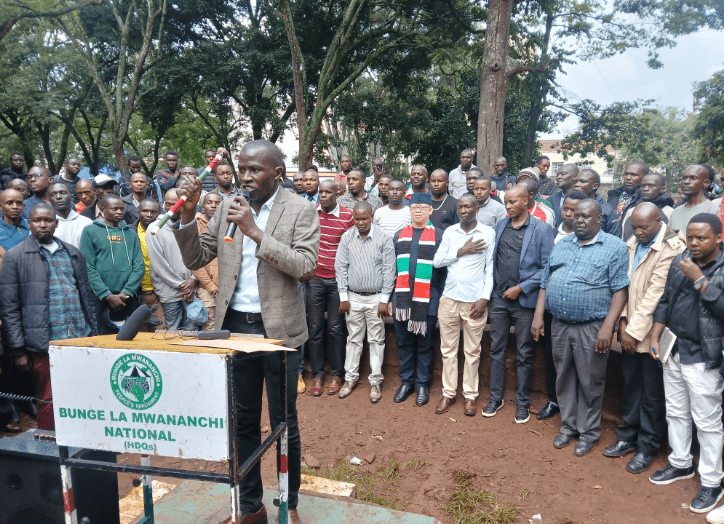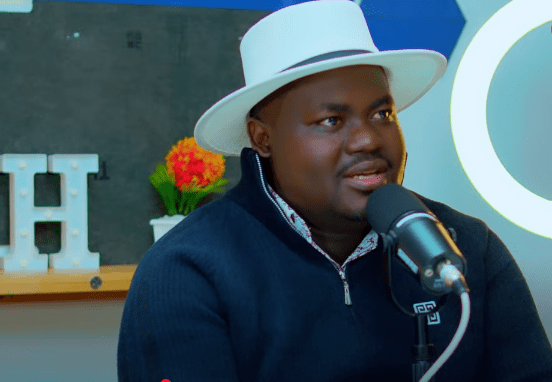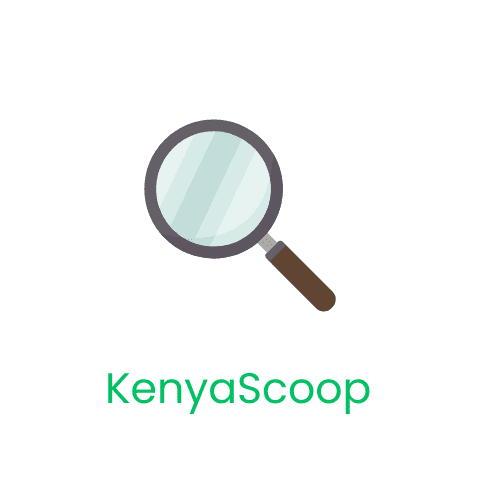- Joakim Simiyu is a leading contributor at Bunge La Mwananchi, an informal forum where Kenyans meet to discuss national affairs.
- The gatherings, which mirror parliamentary proceedings, are predominantly set around Nairobi’s Jevanjee Gardens, Jacaranda Grounds, and sometimes outside the Ambassadeur Hotel.
- In a recent podcast interview with Ken Anthony Jagero, Mr. Simiyu offered a rare glimpse into the inner workings of the seemingly amorphous organization that has long been at the forefront of political agitation.
- Simiyu, a presidential aspirant within Bunge La Mwananchi, discussed the movement’s long-standing traditions, from its election processes and daily activities, to a fresh power struggle over control of a public toilet in Jevanjee Gardens.
Emergence of Bunge La Mwananchi
Bunge La Mwananchi rose to prominence following the closing of ranks between Kenya’s parliament and State House, which is the government’s seat of power.
The latest working arrangement between members of parliament and the president has sparked public outrage, fueling a growing sentiment that the MPs no longer represent the will of the people.
President Ruto’s perceived chokehold on parliament is widely credited with the smooth passage of his legislative agenda, including several key bills backed by his administration.
Some of the controversial legislation passed includes the ones on finance and taxation, housing, and the social health insurance fund.
The bills were dramatically passed in the August House despite ferocious dissent by the public.
The punitive Finance Bill 2024, for instance, led to protracted chaos across the country where tens of youths died and others disappeared.
As nature abhors a vacuum, Bunge La Mwananchi moved in to fill the gap, upholding the agitation for social, economic, and political rights.
Mr. Simiyu also described Bunge La Mwananchi as a rare haven for the often elusive and contentious practice of public participation in Kenya.
He explained that it is only in Bunge La Mwananchi where authorities and representatives could get raw, unfiltered views on proposed initiatives.

Bunge La Mwananchi Unwritten Traditions
Political Headache show host Oduor Jagero probed Joakim on the legitimacy and structure of the citizen barazas.
According to Joakim, Bunge La Mwananchi runs on consensual unwritten tradition and customs, which govern everything from elections to daily proceedings.
Bunge La Mwananchi Elections and Membership
Bunge La Mwananchi has established stable leadership cycles, driven by periodic elections and orderly transitions of power.
Its traditions provide for elections every two years, where registered members fill the following offices:
- President
- Speaker
- National Coordinator
- Women representative
- Youth Leader
Bunge La Mwananchi is reputed for upholding high leadership standards, with all its presidents serving only one term, except for Mr. Samson Ojiayo, who served two.
Aspirants must be recognized members of the forum for at least two years before the election.
Bonafide Bunge La Mwananchi members should meet the following requirements:
- Stipulated monetary contributions
- Attendance at sessions
- Good debating skills

Bunge La Mwananchi Proceedings
Bunge La Mwananchi proceedings are plotted in elaborate order papers that originate from the speaker.
This is evident in numerous clips where even high-profile contributors like Nuru Okanga defer to the speaker.
Tuesdays and Thursdays are designated for ‘formal’ sessions, despite daily gatherings taking place at the venues.
Order papers are drawn from the prevailing political situations and vigorous discussions in members’ WhatsApp groups.
While regulars are often the favorites to speak, new and visiting members are given priority.
Once the speaker moves the motion, he officially opens the floor for members’ contributions. Members are picked by raising their hands.
The Speaker, however, exercises discretion in evaluating participants’ intellectual acumen and expertise when selecting who may speak on various issues.
“There is a curtain-raising session where people contribute random points before specialized debates. It gets to the point where we want concrete information about the agenda. So they will pick people with the capacity to actually raise the debate. And that is what goes to the media,” explains Joakim.
Bunge La Mwananchi Toilet Tussle
A public toilet at Jevanjee Garden in Nairobi is at the center of political powerplay within the ranks of Bunge La Mwananchi.
This is one of the several ablution blocks owned by the City County across Kenya’s capital.
In an act of goodwill, a former governor of Nairobi handed over management of this toilet to Bunge La Mwananchi members.
The toilet has become a high-revenue generator for the members, who congregate under a shade just a few meters away.
A clique has since emerged within Bunge La Mwananchi that allegedly controls the proceeds from the toilet.
This has caused jitters within the forum, with Mr. Joakim acknowledging that the issue has come up during his presidential campaign meetings.
According to the aspirant, members are eager to know how he is going to sort out the problem as Bunge President.
“There is politics around that toilet. The clique that benefits from the toilet money is not comfortable with my presidency. Because they are going to lose some of the coins they get daily,” says Joakim.
Mr. Simiyu seeks to ensure every member benefits through formal accounting, an idea that is being fought by the shadowy sect.
The tussle highlights the opaque management of public toilets across the city, many of which are overseen by loosely organized youth groups and other unknown entities.
Joakim Simiyu’s Agenda For Bunge La Mwananchi
An outspoken political commentator, Joakim Simiyu, insists he wants to make the organization bigger and more influential.
The regular guest on Jagero’s Political Headache podcast admits that he’s got a perception problem to deal with. ‘
The forum’s informal nature sometimes attracts ridicule and is bastardized by a section of society.
Its members decry being compared to “noisy idle villagers” who engage in shallow debates by the roadside.
Despite the current hardships, Joakim seeks to formally register the organization to shake off the casual outlook.
Joakim also notes that the forum’s debating range has long revolved around mainstream politics.
The former city trolley-pusher turned political pundit aims at expanding the debates to feature economic issues more prominently.
Rampant corruption and wanton loss of taxpayer money through conniving white-collar tactics also need to be highlighted with more depth at Bunge La Mwananchi.
Efforts to register the vibrant outfit have been derailed by frivolous obstacles due to its radical nature.
One of the flimsy grounds given for denying its registration is the alleged name conflict with Kenya’s Parliament.
The government is reportedly determined not to register another institution that “resembles” Parliament.
